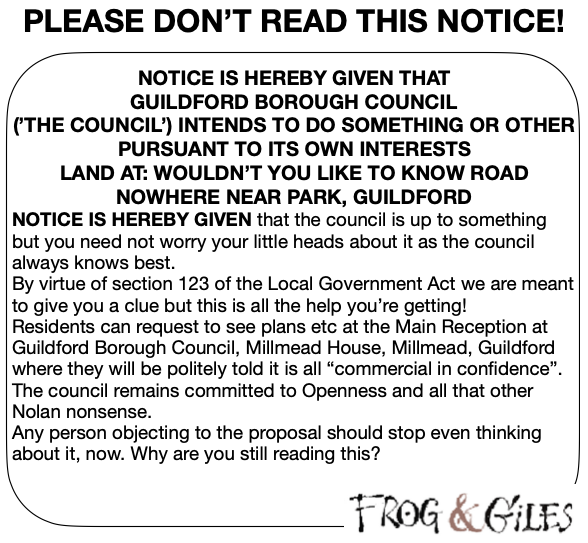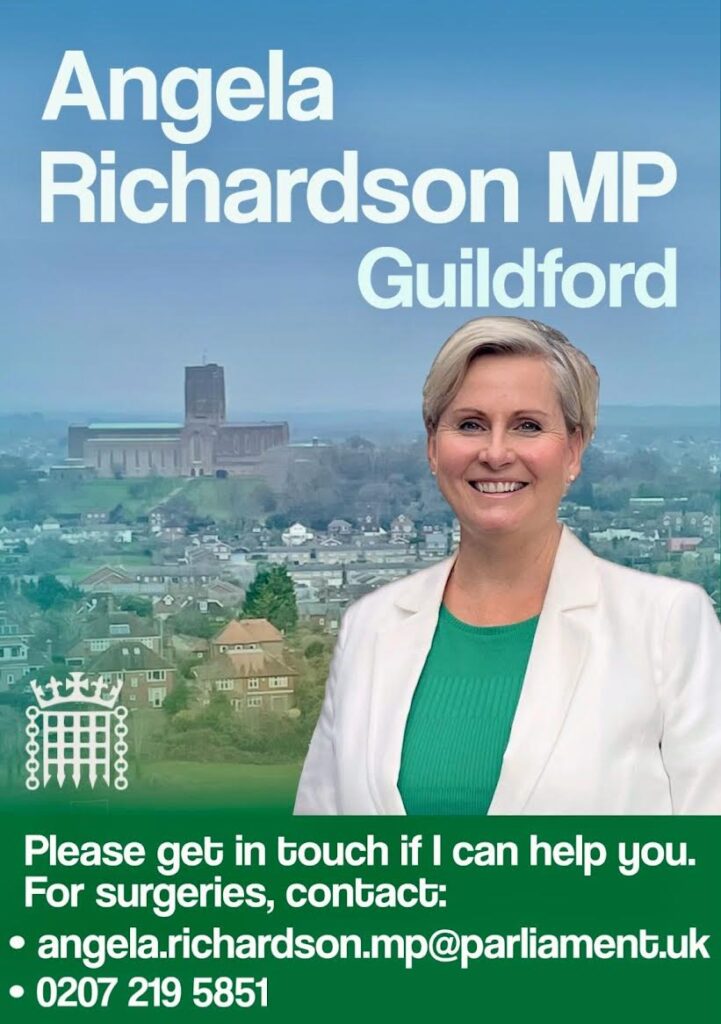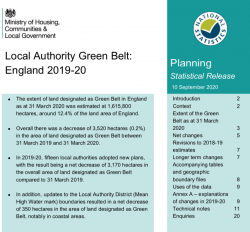 Abraham Lincoln
If given the truth, the people can be depended upon to meet any national crisis...
Abraham Lincoln
If given the truth, the people can be depended upon to meet any national crisis...
 Guildford news...
for Guildford people, brought to you by Guildford reporters - Guildford's own news service
Guildford news...
for Guildford people, brought to you by Guildford reporters - Guildford's own news service
Letter: In Times of Food Shortage, Building on the Land That Feeds Us Seems Unwise
Published on: 18 Oct, 2020
Updated on: 18 Oct, 2020
In response to: Why Did We Lose Green Belt, And What Can We Do About It?
When the recently revealed algorithm for school examinations was shown to be nothing short of a disaster, the Conservative Party at least had the good sense to hold its hands up in a rare mea culpa moment.
Cllr Paul Spooner, and those who voted for a Local Plan that placed Guildford at the top of the green belt annihilation league, still revert to the absurdities of the Plan in an effort to encourage us to believe removing protection from 14.7 square kilometres of Guildford was done to protect the borough.
Green belt can be removed only at the time of Local Plan review. Since 2010, only four councils have removed more than 1,000 hectares or 10 square kilometres of green belt in one swoop. They were Coventry, Warwickshire, East Herts and surprise, surprise, Guildford.
One reason the list is relatively short is because it refers only to authorities that decided to build on green belt. Many others resisted and of course, some are not in green belt (because they don’t need it).
The Labour Party has had very little success in Guildford and Brian Creese’s comments [XREF?} perhaps reflect why. Protection of green views and spaces in and out of the town were supported, but wide open countryside cannot be created in the town, just as every village wouldn’t expect to have a railway station or an abundance of shops and other amenities on their doorstep.
Many people living in the town supported protection of the green belt because the countryside around Guildford belongs to them too. The notion that it is there to protect the views of a few wealthy people demonstrates a lack of understanding of its purpose.
Most of green belt is agricultural and, as we become less self-supporting year on year, I believe to cut off the hand that feeds us is extremely unwise.
Responses to Letter: In Times of Food Shortage, Building on the Land That Feeds Us Seems Unwise
Leave a Comment Cancel replyPlease see our comments policy. All comments are moderated and may take time to appear.

See Dragon story: GBC’s Explanation of Major Land Sale Notice Error ‘Borders on Arrogant’ Says Councillor






Recent Articles
- New Approach to Mental Health Concerns Reported to the Police
- Letter: Bernard Quoroll ‘s Insight Should Be Heard
- Police and Crime Commissioner Candidate Interview – Paul Kennedy
- Staff Union Warns Surrey University of No Confidence Votes
- Invitation to Join Mass Bike Ride on Saturday, April 27
- Thames Water Clarify Compensation Payments
- Surrey Fire and Rescue Service Urges Us All To Be ‘Wildfire Aware’
- Police and Crime Commissioner Candidate Interview – Lisa Townsend
- Insights Part 3: The Council Should Not Be Marking Its Own Homework
- Notice: In Our Own Words


Recent Comments
- Bibhas Neogi on M25 Junction 10 Project Required Major Engineering to Overcome Pipeline Snag
- Roland Dunster on Birdwatcher’s Diary No.302
- J Davies on Insights Part 3: The Council Should Not Be Marking Its Own Homework
- Angela Richardson on Insights Part 3: The Council Should Not Be Marking Its Own Homework
- Peter Wilkinson on Anger Over Traffic Impact of Golf Club Scheme
- Nicola King on Anger Over Traffic Impact of Golf Club Scheme
Search in Site
Media Gallery
Dragon Interview: Local Artist Leaves Her Mark At One of England’s Most Historic Buildings
January 21, 2023 / No Comment / Read MoreDragon Interview: Lib Dem Planning Chair: ‘Current Policy Doesn’t Work for Local People’
January 19, 2023 / No Comment / Read MoreA3 Tunnel in Guildford ‘Necessary’ for New Homes, Says Guildford’s MP
January 10, 2023 / No Comment / Read More‘Madness’ for London Road Scheme to Go Ahead Against ‘Huge Opposition’, Says SCC Leader
January 6, 2023 / No Comment / Read MoreCouncillor’s Son Starts Campaign for More Consultation on North Street Plan
December 30, 2022 / No Comment / Read MoreCounty Council Climbs Down Over London Road Works – Further ‘Engagement’ Period Announced
December 14, 2022 / No Comment / Read MoreDragon Interview: GBC Reaction to the Government’s Expected Decision to Relax Housing Targets
December 7, 2022 / No Comment / Read MoreHow Can Our Town Centre Businesses Recover? Watch the Shop Front Debate
May 18, 2020 / No Comment / Read More







John Morris
October 18, 2020 at 3:41 pm
A couple of points in reply to Fiona Curtis’ letter, partly backed up by a quick search on Wikipedia [https://en.wikipedia.org/wiki/Green_belt_(United_Kingdom)], which reveals that (a) 13% of the land in England was designated in 2010 as “green belt” and that (b) green belts are not synonymous with “countryside” nor with the best agricultural or food-producing land in the country.
Harry Eve
October 18, 2020 at 9:02 pm
The point is that green areas feed us body and soul and the green belt was supposed to protect that source of public wellbeing by limiting urban sprawl.
It is worth remembering that, under the previous administration, Guildford’s planners said they would be coming after more of our green belt in the future despite their previous claim that by giving so much to developers under the Local Plan was a way of protecting it!
Sammy Jenkiss
October 19, 2020 at 6:07 pm
It appears the obvious answer is the one not discussed. Why is it “easier” or “more profitable” to build on protected green belt land, than it is to redevelop brownfield sites? What system, process, procedures and politicians have our successive governments (Labour and Conservative) created that led to this situation?
Legislative changes, incentive changes, culture changes, and so on, could easily change the preference to build on green land first, back to the sensible build on brown first.
Those with the power, money, influence, and in political roles evidently have little or no desire to actually change this for the better. It’s funny, businesses may lobby easily for government change, but individuals, often with better ideas and holistic intentions, aren’t listened to.
Jules Cranwell
October 20, 2020 at 12:50 pm
Residents were never listened to under the previous Tory and Lib Dem regimes. We expect better from R4GV.
Ben Paton
October 21, 2020 at 5:53 pm
“…but individuals, often with better ideas and holistic intentions, aren’t listened to.”
Spot on.
There was massive opposition to the Local Plan. How many thousand objections in all the consultations?
All ignored.